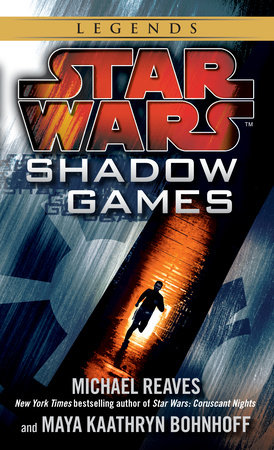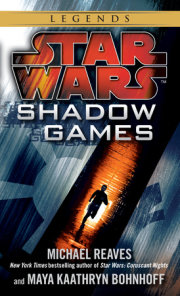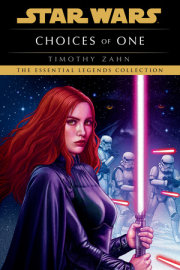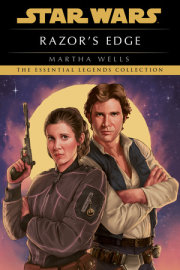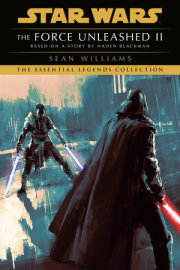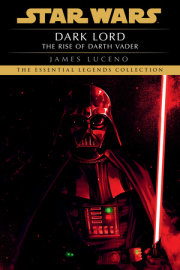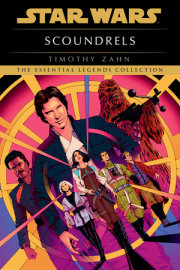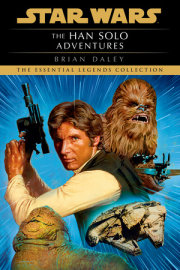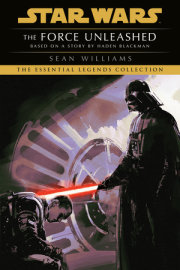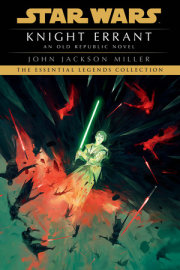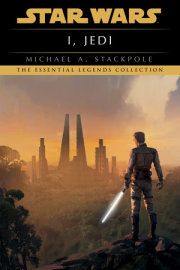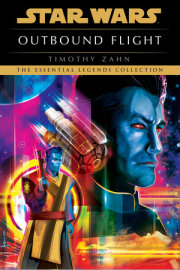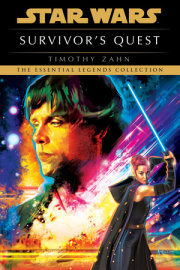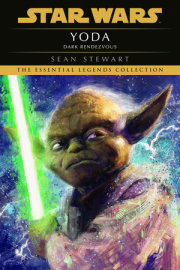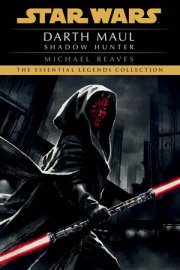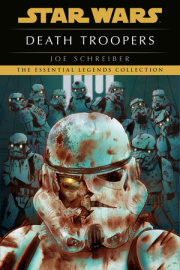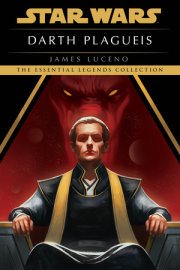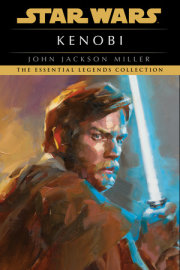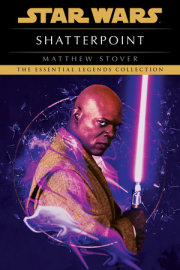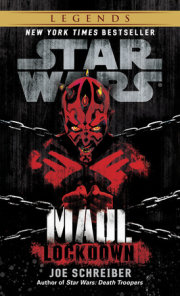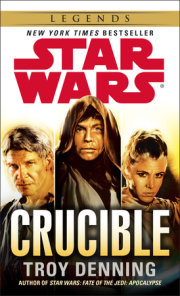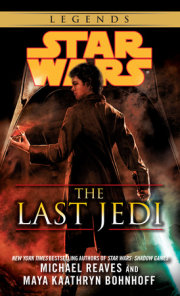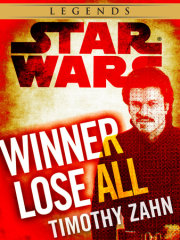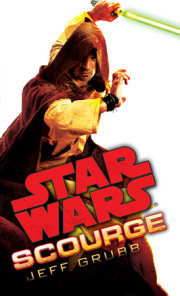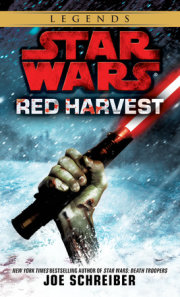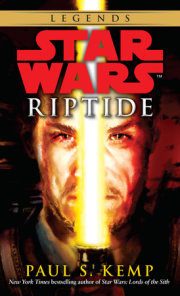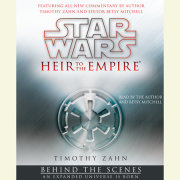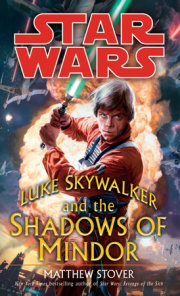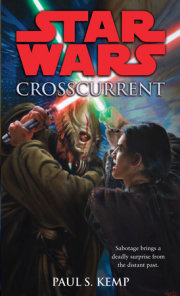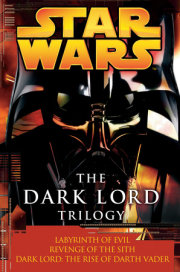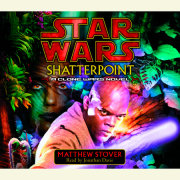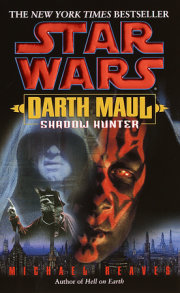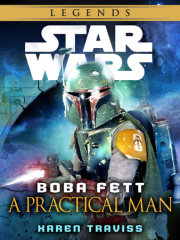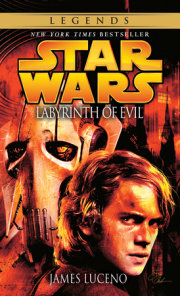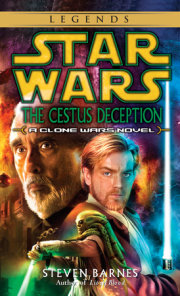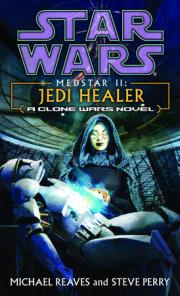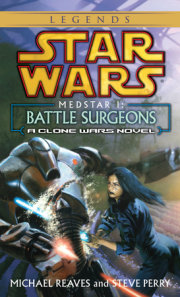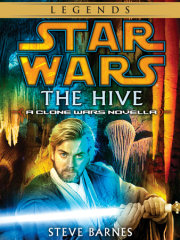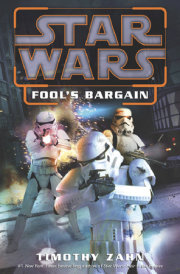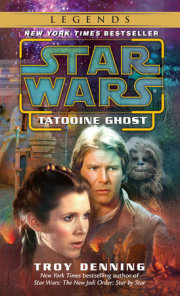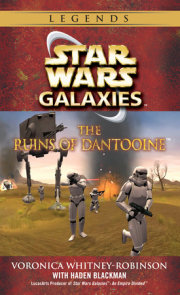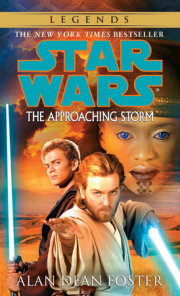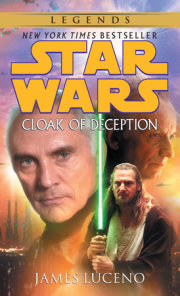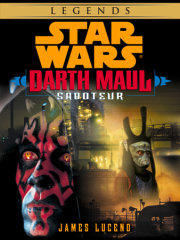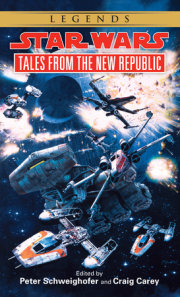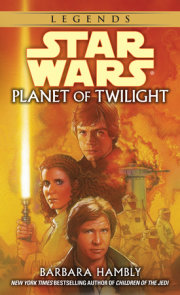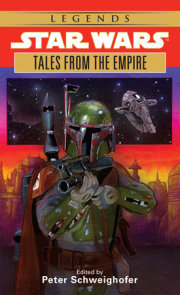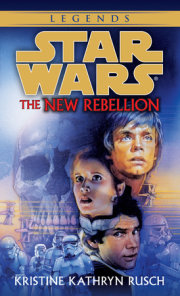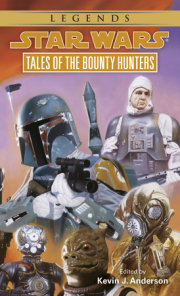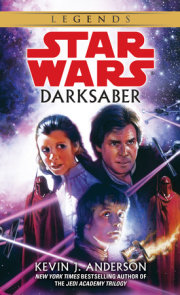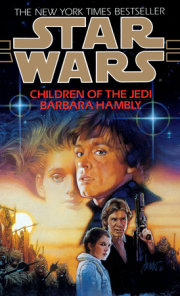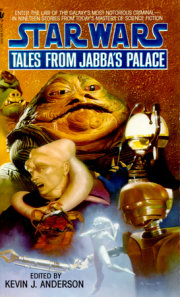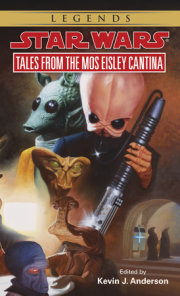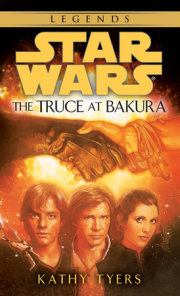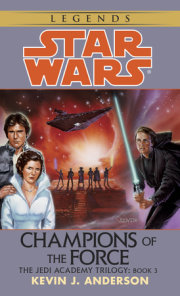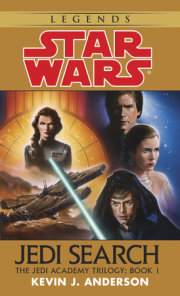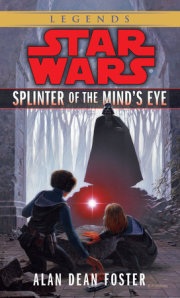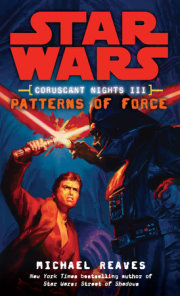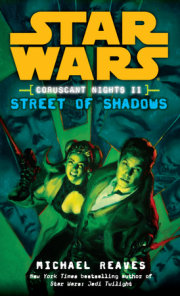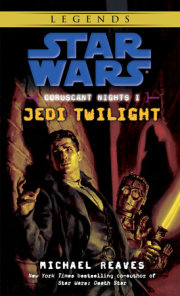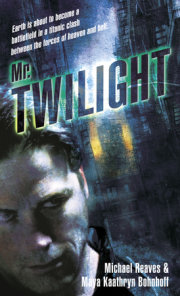ONE
“THIS IS IT, EADEN. THIS IS THE DAY WE ONE-UP SOLO.”
Dash Rendar sat back in the pilot’s chair of the Outrider, feeling an almost palpable sense of satisfaction. It was a good feeling—nearly tingly, in fact. And he expected to relive it every time he bragged about how fast he’d done the Kessel Run. It was, after all, acknowledged to be the ultimate test of a pilot’s skill … and propensity for risk taking. Every time you ran it, you risked your cargo, your life, and your reputation, but you got your goods where they were going faster than more cautious pilots and you could walk into any port with a swagger in your step. The faster your time, the bigger your swagger.
“Hubris,” said Eaden Vrill, his dark, liquid gaze on the tactical display. His voice was a low rumble, more suited for underwater communication than atmospheric, and his Basic took some getting used to, with its hard-edged fricatives and sibilants. Dash was used to it; he and the Nautolan had been partners for some time.
“Confidence,” Dash retorted, annoyed at being pulled out of his pleasant reverie. “The Outrider is twice the ship the Falcon is.” As far as he was concerned Solo’s boat was a scow compared with Dash’s heavily modified YT-2400.
Eaden glanced at him. “You confuse pride of possession with a distinct entity. The ship is not you, nor did you build it. Its speed—”
“Is largely the result of my expert modifications.”
“Beg to differ,” the Nautolan replied. “The improvements are almost entirely the result of repairs carried out by LE-BO2D9. The rest is unarguably the result of my superior navigation skills.”
Dash glanced at his navigator. “Now who’s overweening? Hubris, my—”
“You imply that I’m boasting. I’m not—but feel free to correct me if I’ve misinterpreted your colorful patois. I am concentrating.” He hesitated, then added: “We’re entering the Pit.”
Reason enough to concentrate, Dash knew. He rocked his seat forward, hitting the comm button on the pilot’s console as he did. “Hey, Leebo, we’re headed into the Pit.”
“Imagine my excitement.” The reply came back in the sarcastic voice of the repair droid’s previous owner, Kood Gareeda—a stand-up comic who toured the Rim perpetually. Dash had seen Gareeda’s routine; he was wise to keep moving.
“I guess I’ll have to,” he said in response.
“Try not to break the ship—again,” Leebo added. “And try especially hard not to give me anything to shoot at.”
“Do my best.” Dash took the steering yoke and turned off the autopilot. “Course?” he prompted Eaden.
The Nautolan navigator locked the course coordinates into the navicomp, and Dash watched them appear as a bright saffron arc on the tactical display. He frowned at the solid yellow line. “Hey, this isn’t a leisurely holiday tour.”
“You refer to the arc of our course?”
Dash sighed and pointed at the navicomp monitor. “Look at the blasted line. Do you see red?”
Eaden looked. “I see no red.”
“That’s because the course you set is safe.”
“And this is a problem because?”
“Because safe isn’t gonna better Solo’s time.”
Eaden Vrill blinked his extraordinarily large maroon eyes. Two of his fourteen tentacle-like tresses lifted their tips toward Dash. “You wish me to recalculate?”
“What I wish is to beat Solo’s alleged record.”
“I’m simply being careful. We have an expensive cargo that we have yet to be paid for.”
“All the more reason to get it to port quickly,” Dash said. He gestured at the monitor. “So reset the course, please. We have to skate as close to the Maw as Solo did. Closer, if possible.”
Eaden made an almost subsonic rumble of disapproval and ran nimble fingers over the console. The arc of light on the tactical display shot forth again. The curve was more pronounced now, running closer to the Maw, where the color deepened from yellow to orange to a satisfying shade of crimson.
“Keep in mind,” Eaden cautioned, “that nothing in the galaxy is static. The orbital trajectories of stars, systems—”
“Are negligible within the context of human and humanoid life spans. If I were a Cephalon, say, it might be something to worry about.” Dash took the steering yoke in hand, aimed the Outrider along the flaming arc, and punched the hyperdrive.
It was just a microjump to put them in the vicinity. To fly hyper along the edge of the Pit was almost impossible. For one thing, the gravity well could yank you out of hyperspace in a heartbeat even if you’d tinkered with your failsafes—which, of course, Dash had. Then there was the fact that the hard radiation from the nebula that cradled the asteroid field played havoc with instrumentation—adhering to a set sublight course that skirted the fringes of the Pit was about the only way Dash knew he could come through in one piece. Deviation on one side could result in clipping a wandering asteroid; deviation on the other would send the ship into the gravitational pull of the Maw, a cluster of black holes that warped local space. Fly too close to one of those singularities and all kinds of bad things could happen—not the least of which was having one’s atoms stretched to an infinite length by the tidal forces that waited to tear everything apart.
He was counting down to the end of the jump when the Outrider trembled abruptly, the unexpected vibration passing through Dash’s hands and up his arms. He frowned. That wasn’t right. He opened his mouth to say something to Eaden when the ship bucked like a fractious tauntaun and dropped out of hyperspace.
“What the—”
“Oh, mother of chaos!” Leebo’s bleat came through the com in a wash of static. “Incoming!”
“Incoming what?” Dash looked frantically at the tac display—which made no sense. There was no gravity well here—
“Incoming Imperials! There’s an Imperial cruiser bearing down on us from astern—Interceptor-class!”
Dash swore in three languages—adding several choice moans in Wookieespeak. The Interceptors had gravity generators—four of them—that could suck a smaller ship right out of hyperspace or keep it from fleeing by producing a false gravity well. They’d flown right into a trap—probably set up here at the top of the Kessel run for the express purpose of catching smugglers.
The ship rocked violently to port and Leebo uttered a shrill, metallic squeal.
Before Dash’s eyes the tac display finally made sense. Outrider had dropped back into realspace close enough to the contents of the Pit that they were practically kissing the asteroid field. If the cruiser’s gravity well had hit them a few seconds sooner, they might have hit something big enough to hurt. Bad.
He pushed the thought down and focused on the display. A slowly rotating planetoid the shape of an egg and the size of an old-style generation ship lay several hundred klicks off their port bow. It was moving lazily across the general flow of rocky traffic, rolling on its long axis. In a split second, he’d made his decision. They’d hide behind that and use it to guard their flank while they made their getaway.
He manhandled the steering yoke hard to port and hit the ion drives hard. The Outrider leapt toward the egg-shaped planetoid, nosing down slightly in anticipation of dropping beneath the great rock.
When they were close enough that the bulging flanks of the planetoid filled the forward viewport, there was a resonant ping from the proximity sensors and Eaden sat bolt upright. “Target dead ahead!”
“And up!” Leebo screeched through the intercom. A barrage of laser fire erupted from the Outrider’s cannon emplacement at the upper horizon of the planetoid. Dash looked up and felt his blood run cold. Over the close horizon of the great gray egg loomed the bow of an Imperial light cruiser, its laser ports glowing red. Leebo’s useless salvo had pattered harmlessly against its heavy shielding.
Dash thrust the steering yoke forward. The ship plummeted in response, accelerating as she dived beneath the planetoid. A trail of laserfire from the Imperial ship lit up her wake.
“What are you doing?” cried Leebo.
“Proving that size isn’t everything!”
Dash continued to accelerate, giving the Outrider even more juice as they passed beneath the long axis of the planetoid and began ascending. The cruiser was five times bigger than the Outrider, which meant it was, at minimum, at least five times less maneuverable. By the time the captain figured out what Dash was doing and was able to turn the ship or order up a new firing solution, the target would be gone.
He hoped.
The Outrider described a perfect semicircle in the void of space, pressor beams providing maneuverability in the vacuum. It sailed around the planetoid upside down relative to the cruiser and whizzed over it toward the Maw.
“I need a quick course adjustment,” he told his navigator, then spared a second to glance at the rearview screen. As he had hoped, the Imperial captain had read his move as an attempt to flee and had started to turn his ship in anticipation of pursuit into the Pit. He was still swinging to port as the Outrider streaked away in the opposite direction, toward the cluster of black holes.
“I sometimes think,” said Eaden, as his webbed fingers played over the instrumentation, “that you are a certifiable madman. I assume you want a course that the Imperials will be loath to follow.”
“I want the Imperials to think I’ve chosen death over dishonor.”
The Nautolan gave him a sidewise glance. “You may well have done just that.”
“Cute. Range to the rim of the Maw?”
“Two-point-three light-hours and closing.”
Dash’s gaze swept the tactical display, taking in the diffuse rims of the gravity wells, depicted in the display as broad, glowing bands of faded orange. If they eluded the cruiser, and went to hyperspace at the right moment and dived into the Maw at just the right angle, they could, with more luck than anyone had any right to expect, use their superluminal velocity to skip them along the outer edge of the region like a flat stone across a lake. Theoretically, anyway. If the gravitational waves generated by the various collapsed masses didn’t muck up their navigation or suck them out of hyperspace again. If they could maintain a safe course through the complicated orbital arabesques being performed by the singularities. If they could get far enough from the Imperial’s gravity generators to make the jump in the first place.
Copyright © 2011 by Michael Reaves and Maya Kaathryn Bohnhoff. All rights reserved. No part of this excerpt may be reproduced or reprinted without permission in writing from the publisher.

